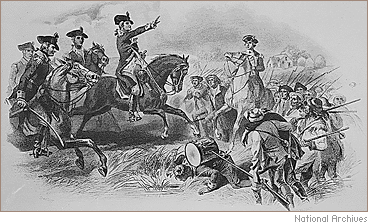Content:
The American Revolution: Loyalist or Rebel?
Strategy:
Doing Simulations

The decision of whether to act as a loyalist or rebel during the Revolutionary War period was a complicated one. Economics, race, social status, tradition, love of one's homeland, moral and ethical considerations, and fear and intimidation all played a part in the colonists' decisions when choosing sides. Interestingly, the colonists' dilemma -- individual action in support for or opposition to war -- is one that has been repeatedly faced by Americans throughout history during most major wars and conflicts. Because of this repetition, the issues surrounding loyalism and rebellion remain relevant to today's students. In this session, you will take on the role of a loyalist or rebel in a town meeting simulation as you reflect on the colonists' dilemmas regarding war with England. You will also explore the simulation teaching strategy as a way to personalize history and make colonial American content more relevant to today's students.
Content Focus
After completing this session, you will be able to:
- know and understand some of the major factors/critical events that influenced various groups of colonists to stay loyal to England or to join the patriot cause during the revolutionary period, and be able to place colonists' decisions in context; and
- understand the broader causes of the American Revolution -- such as economics -- that led to sweeping change within the colonies.
Strategy Focus
After completing this session, you will be able to:
- understand the concept of personalizing history and be able to make colonial American content relevant to students; and
- be able to organize and lead a historical simulation activity and a post-activity debrief.
Next > Reflect on Your Knowledge














